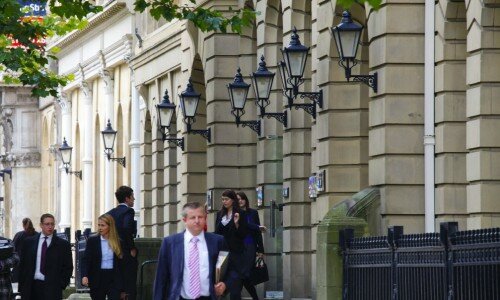
Reasons to be cheerful replaces jaws of doom as Birmingham reaps economic recovery
Cover Image:
Birmingham council leader Sir Albert Bore struck a surprisingly optimistic tone in his annual state of the city address, admitting that economic recovery was making a big difference and applauding a 68 per cent increase in inward investment in the past year.
Warming to his good news theme, Sir Albert said Birmingham was now the third most visited city in the UK for business and leisure trips behind London and Glasgow. Job creation was at record levels and being driven forward by small businesses and “the hundreds of young entrepreneurs who represent the future of our economy”.
“These are remarkable statistics given where we were 20 or 30 years ago,” he added.
Sir Albert admitted that acute economic challenges remained, but there was no mention of his Jaws of Doom graph depicting an £800 million spending squeeze imposed on the council by the Government. And he only touched briefly on the prospect of axing some public services as the council tries to find ways of saving a further £300 million over the next two years.
He said the controlling Labour group’s priorities remained fairness, prosperity and democracy.
“The common thread is that we are looking for the same opportunities for everyone in the city no matter where they live or what community they come from.”
But the central message from the council leader was a clear warning that the West Midlands must grasp the opportunities for devolution that are being dangled by the Government and also proposed by Labour leader Ed Miliband.
Sir Albert said Mr Miliband had made it clear that a promised £30 billion growth fund would only be available to city regions where councils could show they were working closely together. The Chancellor, George Osborne, takes a similar view. It was obvious that there would be very different funding arrangements for local government whoever won the General Election.
In an interview with Chamberlain News before giving his annual policy statement, Sir Albert warned that Birmingham and the West Midlands was in danger of “being left behind” by the five English combined authorities, led by Greater Manchester. “We need to get up with the leaders of the pack,” he added.
Sir Albert stressed that he wasn’t necessarily recommending setting up a Greater Birmingham combined authority, but he did want to see much closer co-operation between the Greater Birmingham and Solihull LEP and the Black Country LEP.
He added: “I am not trying to dismantle GBSLEP. The economic footprint is correct because it is a travel to work footprint. What’s missing from it is the east-west flow which is Birmingham and the Black Country and Solihull. That is where we need to get to.”
Sir Albert told the city council: “The time has come to get serious about how we govern the city region and achieve the ambitions and the hopes for economic success that are shared by people from every neighbourhood across the conurbation.
“The plain fact is that we are in danger of being left behind by the five city regions that have already established combined authorities to provide the accountability and the financial strength to drive investment and work together more effectively.
“This is not about Birmingham persuading our neighbours to work with us. It is about all of us being willing to share resources and work together to a shared agenda.”
He promised to push ahead with the devolution of council services to neighbourhood level, promising “the most radical review of local government arrangements in more than a decade”.
Sir Albert said the pace of change had to be stepped up in some areas, particularly children’s safeguarding and social care where the council has been inadequate and working under Government special measures for more than five years.
There was a hint at further structural changes to the council and the way services will have to be delivered in future if spending restrictions remain in place: “Ultimately, our vision for a democratic city will require a fundamental rethink of how we deliver public services and the role of our local civic institutions including the city council.
“The scale of funding cuts now being implemented by central government means that, without radical reform, many essential and statutory services will be drastically reduced or discontinued, and we will be unable to work effectively for the future city we want to see.”
But the overall tone was upbeat as Sir Albert looked forward to a Greater Birmingham where the council would work in partnership with neighbours and the business community to drive growth across the city region.
Similar Articles
PM: gave unlawful advice; frustrated Parliament
"Scenes." As young people would say, writes Kevin Johnson. "Unlawful." "Unequivocal." "Historical." These words are not,
WMCA: Nothing to see here…move along
As the Prime Minister prepared to address leaders ‘up North’ gathering for the Convention of
HS2: new driver needed
Is the Oakervee Review "welcome", "frustrating" or the end of the line for HS2, asks
Dawn goes Down Under
It might appear that Birmingham city council changes its chief executives more regularly than its
Hezza: Give Metro Mayors greater powers to deliver housing, skills and jobs
Britain’s metro mayors should be given greater powers over housing, schools and jobs to truly










